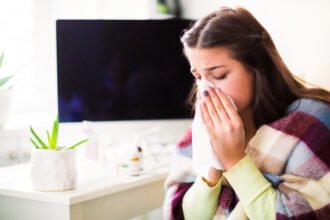
Get the tissues ready! Environmental experts are predicting that this year’s fall allergy season will longer and more severe than any allergy season in recent memory.

Get the tissues ready! Environmental experts are predicting that this year’s fall allergy season will longer and more severe than any allergy season in recent memory.
Due in part to 2012′s extreme weather swings, unusually warm winter, summer heat waves, and months of drought, allergists from the American College of Allergy, Asthma and Immunology say hot temperatures caused plants to produce 3 to 4 times more pollen than usual, particularly ragweed. Fall hay fever sufferers can expect to hunker down for a prolonged season of itchy eyes and sneezing. Experts say this year’s ragweed season could last over a month longer than usual, extending fall allergy season into late October and November.
According to the Centers for Disease Control, 7.2 million Americans age 65 and older suffer with allergic rhinitis, also known as allergies or hay fever. While seasonal allergies are common at any age, they can seriously impact the health of seniors and the elderly. Because mucus membranes in the nose become dry with age, the elderly are at greater risk for chronic nasal congestion. Allergies can complicate the health status of those with chronic illnesses such as heart failure, chronic obstructive pulmonary disease (COPD), and asthma.
Ragweed is the most common cause of allergic rhinitis in the U.S., affecting over three-quarters of all allergy sufferers. Fall can be a particularly difficult time as ragweed begins to release pollen into the air. A single ragweed plant can produce up to 1 million grains of pollen each day, which can then be distributed by winds up to 400 miles away from the source plant. Allergic reactions may include itchy or puffy eyes, runny nose, nasal congestion, sneezing, and sore throat. For asthma sufferers, contact with the ragweed allergen can trigger an asthma attack and make breathing very difficult.
If your elderly loved one suffers from allergic rhinitis or ragweed allergies, try these tips to help reduce symptoms and allergen exposure this Fall:
- Ragweed allergies tend to be most severe earlier in the day. Stay indoors as much as possible when pollen counts as highest, especially in the early morning when pollen is released. Try to avoid extended time outdoors on windy days.
- When traveling by car with your loved one, keep the windows closed and the air conditioner on.
- At home, use air conditioning to clean the air of dirt and debris. Change filters every few months to ensure that air entering the home is properly purified of allergens.
- Wash sheets, blankets, curtains and other linens in hot water to reduce dust mites.
- Shower or bathe after spending times outdoors to remove pollen from hair and the skin.
- After spending time outside, remove jackets and shoes immediately upon re-entering the home. If possible, put on a clean change of clothes.
- Vacuum the home regularly to remove dust mites from carpets and rugs. Spray furniture polish is also very effective for reducing mites and allergens.
- Follow a healthy diet. There is some evidence which shows that a diet rich in omega-3 fatty acids (found in fish, almonds, walnuts, pumpkin, and flax seeds) and probiotics (found in many yogurts) may help reduce the severity of allergic rhinitis symptoms.

You can further help your elderly loved one fight seasonal allergies this Fall by tracking the pollen count in your area. Visit the National Allergy Bureau at: http://www.aaaai.org/nab.






